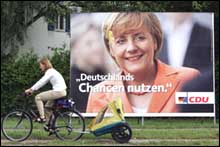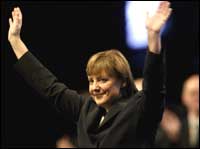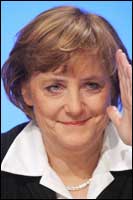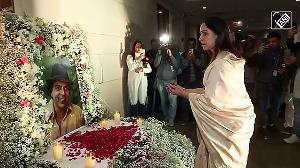If the Christian Democratic Union leader, Angela Merkel, beats Gerhard Schroeder in the next election in Germany in September, as the polls seem to indicate, it will be a historic change for Germany. She will be Germany's first-ever woman leader and the first chancellor from the erstwhile East Germany. My contact list will register a quantum leap in protocol as it will have a serving head of government on it.
 My encounter with Angela Merkel took place in March 1995 when, as the environment minister of Germany, she presided over the first conference of parties to the Climate Change Convention in Berlin. As the leader of the Indian officials' delegation, (the ministerial delegation was led by Minister Kamal Nath) I was a vice-president of the conference and also the spokesman of the largest group of developing countries.
My encounter with Angela Merkel took place in March 1995 when, as the environment minister of Germany, she presided over the first conference of parties to the Climate Change Convention in Berlin. As the leader of the Indian officials' delegation, (the ministerial delegation was led by Minister Kamal Nath) I was a vice-president of the conference and also the spokesman of the largest group of developing countries.
The G-77, the traditional group of developing countries, could not operate in Berlin as the issues at the conference had divided the G-77 into three distinct groups. When I presented a platform for the whole of G-77 at the beginning of the conference, I found that neither the OPEC countries, who did not want any reduction in the use of fossil fuels, nor the Association of Small Island States (AOSIS), who wanted immediate reduction of emission of greenhouse gases by all countries, could join it.
The only way was to proceed with the negotiations on behalf of a group of like minded developing countries, which demanded that the industrialised countries should accept additional commitments to reduce greenhouse gases, without imposing such restrictions on developing countries.
The North also was divided as the Europeans had already reduced their emissions and they were willing to accept deeper cuts. A group called 'JUSCANZ' (Japan, US, Canada, Australia and New Zealand) was the extremist group among the developed countries. No agreement appeared possible on a Berlin Mandate, which the Germans wanted to forge at the conference.
Merkel was new to the whole exercise as her predecessor, Klaus Topfer, an acknowledged authority on the environment,  was handling the issues till a few months before Berlin.
was handling the issues till a few months before Berlin.
Merkel, though born in the west (Hamburg), was unmistakably East European in her appearance, having been brought up in Templin from the age of 3. Her hairstyle provided a bonanza for the caricaturists in the west as she rose in the political hierarchy under Helmut Kohl. At the first bureau meeting of the conference, she pretended as though she was totally ignorant of the issues and made us all talk on the complexities of the conference agenda.
We were greatly impressed by her quick grasp of the issues, though she kept telling us that she was new to international diplomacy and that we should guide her. She quickly identified not only the issues, but also the key players and began individual consultations with the group leaders. She asked me to meet her every morning to brief her on the developments of the previous day from my perspective.
I found her extremely well informed by the time I met her and her purpose was to see how our group was reacting to the evolving situation in the conference. The rapport she developed with each one of us was a great advantage for her in feeling the pulse of the conference.
A draft of a 'Berlin Mandate' I presented on behalf of my group caused a stir in the conference as it demanded increased and continued commitments on the part of the developed countries, without any commitments for developing countries. Many of the western NGOs and others joined with us as their immediate concern was to impose restrictions on greenhouse gas emissions by the conspicuous consumers. All other groups protested vociferously, including OPEC and AOSIS, for their own reasons. There was little hope of a compromise till the middle of the conference, even though Merkel tried tirelessly to bring us closer. Her meetings with the bureau turned out to be fruitless.
At one of my morning meetings, I suggested to Merkel that she should begin substantive consultations with the groups and engage in some shuttle diplomacy. To help her in the process, I gave her my bottom line, which was that we would give no concessions on commitments for developing countries, but we could go along with the concept of 'Joint Implementation', which was dear to the west. I suggested that she should ascertain the minimum positions of the other groups also and try to find common ground. She accepted the idea immediately as my position on 'Joint Implementation' had opened a window of opportunity for her to work on.
And thus began the Merkel shuttle diplomacy, which eventually enabled the conference to reach agreement on a Berlin Mandate.
Merkel added further sophistication to the shuttle diplomacy idea by inviting the two major groups to occupy two different rooms near her own chamber and shuttled between the two for two full nights. We had plenty of time to discuss our strategy and to relax and enjoy the German goodies, when she was with the other group and the atmosphere in both the groups began to brighten up as the night progressed.
 During the day, we continued the sterile debate in the committee. In the early hours of the morning of the last day of the conference, Merkel invited both the groups together for champagne in her room as she had found common ground and she was ready to present her own draft of the Berlin Mandate to the conference.
During the day, we continued the sterile debate in the committee. In the early hours of the morning of the last day of the conference, Merkel invited both the groups together for champagne in her room as she had found common ground and she was ready to present her own draft of the Berlin Mandate to the conference.
We accomplished our objective of leaving the developing countries without commitments and the west managed to keep their commitments at a modest level. They were also happy that they could, under Joint Implementation, fulfil part of their commitments in developing countries at less cost and inconvenience. The foundations were laid for the Kyoto Protocol. There and at the conference later, she said that it was my idea of shuttle diplomacy that made the conference successful.
Merkel's troubles did not end with the adoption of the Berlin Mandate. At the final plenary meeting, as we were complimenting each other for the accomplishments of the conference, a group of men and women rushed into the conference hall and tried to take over the mike to condemn the Berlin Mandate as inadequate.
Merkel was at her best at that moment and proved her immense political and crowd management skills. She allowed the protesters to stay in the hall as she explained the rationale of the decision. She disarmed them by quoting from the Indian representative that he had been in touch with the NGOs throughout and that his initial draft was prepared in consultation with some of them.
The Berlin conference was Angela Merkel's first foray into international diplomacy and her first major environment conference. The success of the conference was a feather in her cap, which is now adorned with other more glittering feathers and she is likely to win even the crown of German chancellorship.
In her excitement then, she told us that if she ever wrote her autobiography, the conference and the role of each one of us will be described in detail. But as the chancellor, she will have much more important matters and men to write about. The Berlin conference may turn out to be a passing reference or even a footnote.
Photographs: Getty Images
T P Sreenivasan is a former ambassador to the United Nations, Vienna, and former governor for India, International Atomic Energy Agency, Vienna
Encounters: More in Ambassador Sreenivasan's series on interesting people





